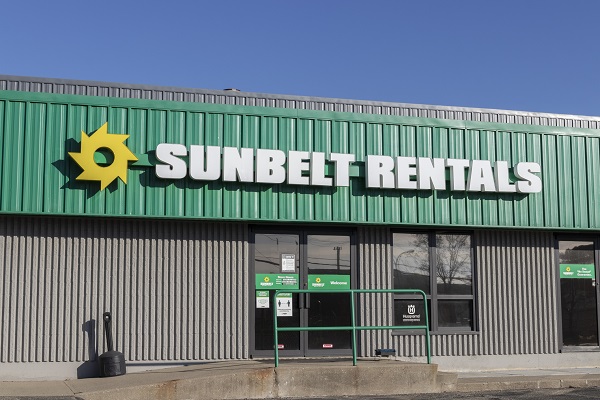ii view: hire group Ashtead hurt by slow Hollywood restart
High exposure to the US economy and with the dividend payment having grown more than 15 consecutive years. Buy, sell, or hold?
5th March 2024 11:34
by Keith Bowman from interactive investor

Third-quarter trading update to 31 January
- Revenues up 9% to $2.66 billion
- Adjusted profit (EBITDA) up 7% to $1.17 billion
- Net debt of $11.17 billion, up from $10.6 billion at the of Q2
Chief executive Brendan Horgan said:
“Our end markets in North America remain robust with healthy demand, supported in the US by the increasing number of mega projects and recent legislative acts. We are in a position of strength, with the operational flexibility and financial capacity to capitalise on the opportunities arising from these market conditions and ongoing structural changes.
“We look forward to launching our next strategic growth plan, Sunbelt 4.0, during our capital markets event in late April, which will detail our runway for further success. The Board looks to the future with confidence."
- Invest with ii: Open a Stocks & Shares ISA | ISA Investment Ideas | Transfer a Stocks & Shares ISA
ii round-up:
Equipment hire company Ashtead Group (LSE:AHT) today lowered its full-year rental revenue growth expectations, affected by reduced demand from emergency hurricane rescue activity and a slower restart from the previously strike hit film industry.
Ashtead, which trades under the Sunbelt brand in North America and the UK, now expects 2024 revenue growth at the lower end of its previous 11-13% estimate. Management’s initial forecast for capital expenditure over the year ahead is expected be up to $3.3 billion, lower than City estimates of $3.6 billion and potentially leaving 2024/2025 profits 10% below analyst estimates.
Shares in the FTSE 100 company fell as much as 6% in UK trading having come into this latest news little changed over the last year. That’s better than a one-third fall for smaller rival Speedy Hire (LSE:SDY) over that time and compares to a near 4% retreat for the FTSE 100 index itself.
Ashtead rents a full range of construction, industrial, lighting and emergency power generating equipment, with over four-fifths of its sales coming from the USA.
Third-quarter rental revenue growth fell 7% year-over-year from 11% in the prior second quarter, leaving growth in adjusted profit (EBITDA) of 7% to $1.17 billion, down from growth of 12% in Q2.
Ashtead added 106 new rental locations in North America in the nine months to late January, spending $906 million on bolt-on acquisitions, down from $970 million this time last year.
Net debt of $11.17 billion rose from the prior quarter’s $10.6 billion, with its ratio to adjusted profits (EBITDA) rising to 1.9 times from 2023’s 1.6 times.
Broker Morgan Stanley reiterated its ‘overweight’ stance post the update, flagging an estimated fair value price of £63 per share. A fourth-quarter trading update is schedule for 18 June.
ii view:
Founded in Ashtead, Surrey, this FTSE 100 company today rents out more than 1 million items to over 800,000 different customers. Its equipment to hire includes aerial platforms, air compressors, heaters, lighting, and water pumps. Geographically, the US generated most of its sales during its last full financial to late April 2023 at 85%, followed by the UK at just over 8%, and Canada the balance of around 6%.
For investors, the frequency and strength of natural events such as hurricanes and wildfires and the volatile impact created on demand hire cannot be overlooked. Events outside of management’s control such as strikes in a particular customer sector warrant consideration. So do heightened borrowing costs given group net debt of over $11 billion. Potential changes of the US government and possible cuts in infrastructure spending given historically high US government debt, are also a threat.
- Spring Budget preview: what should you expect?
- The Income Investor: don’t underestimate the value of dividend growth
- Insider: share slip is buying opportunity for these directors
More favourably, Ashtead's core US market is summarised by management as ‘robust’ with sales supported by an increasing number of mega projects and previous government law bills. Bolt-on acquisitions have helped it to increase location diversity, costs remain a focus, while the dividend payment has been increased for more than 15 consecutive years, leaving the shares offering a forecast dividend yield of around 1.4%.
For now, and while downgrades to sales forecasts offer room for caution, long-term fans of this historically well managed company are likely to stay patient.
Positives:
- Product and customer diversity
- Progressive dividend payment
Negatives:
- Tough economic backdrop
- High dependency on US business
The average rating of stock market analysts:
Buy
These articles are provided for information purposes only. Occasionally, an opinion about whether to buy or sell a specific investment may be provided by third parties. The content is not intended to be a personal recommendation to buy or sell any financial instrument or product, or to adopt any investment strategy as it is not provided based on an assessment of your investing knowledge and experience, your financial situation or your investment objectives. The value of your investments, and the income derived from them, may go down as well as up. You may not get back all the money that you invest. The investments referred to in this article may not be suitable for all investors, and if in doubt, an investor should seek advice from a qualified investment adviser.
Full performance can be found on the company or index summary page on the interactive investor website. Simply click on the company's or index name highlighted in the article.